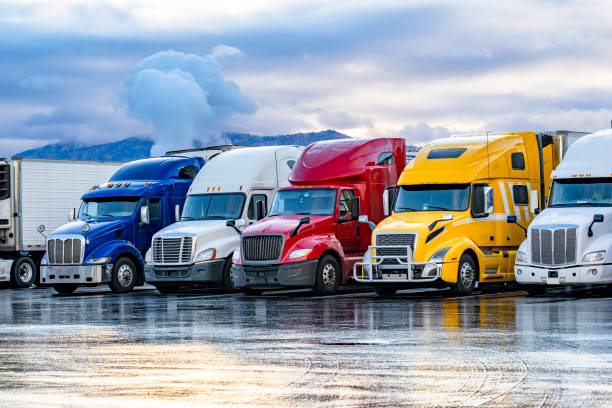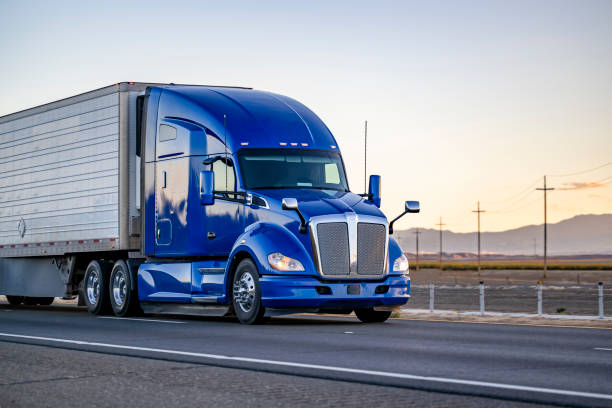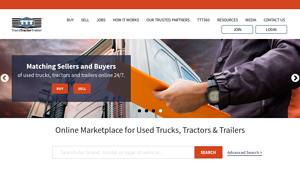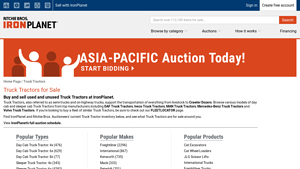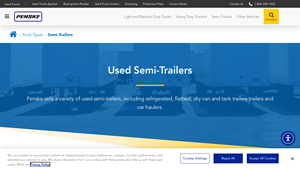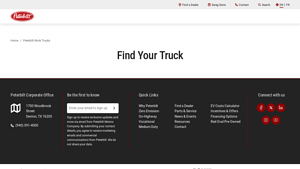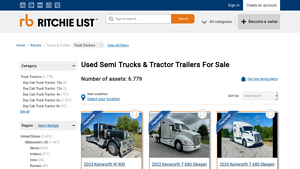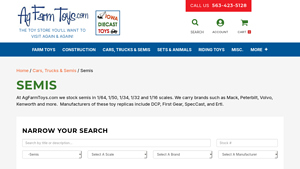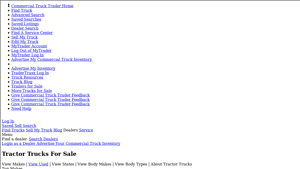Introduction: Navigating the Global Market for tractor Trailer Trucks
In today’s competitive landscape, sourcing tractor trailer trucks presents significant challenges for international B2B buyers, particularly those in regions like Africa, South America, the Middle East, and Europe. With the growing demand for efficient freight transportation, buyers must navigate an intricate web of options while ensuring they secure reliable and cost-effective vehicles. This guide serves as a comprehensive resource, addressing crucial aspects such as the various types of tractor trailer trucks, their applications across different industries, and the process of vetting suppliers to ensure quality and reliability.
From day cabs to sleeper trucks, understanding the specifications and functionality of each type is essential for making informed purchasing decisions. Furthermore, this guide delves into critical factors like cost analysis, financing options, and warranty considerations, empowering buyers to maximize their investment. It also emphasizes the importance of thorough supplier evaluation, ensuring that buyers can confidently engage with reputable manufacturers and distributors.
By providing actionable insights and a structured approach to sourcing tractor trailer trucks, this guide is designed to equip international B2B buyers with the knowledge necessary to navigate the global market effectively. Whether you’re in Nigeria looking to expand your fleet or in Vietnam seeking reliable transportation solutions, this guide will help you make strategic decisions that align with your operational goals and budgetary constraints.
Understanding tractor Trailer Trucks Types and Variations
| Type Name | Key Distinguishing Features | Primary B2B Applications | Brief Pros & Cons for Buyers |
|---|---|---|---|
| Day Cab Truck Tractor | No sleeping compartment, shorter wheelbase | Local deliveries, short-haul transport | Pros: Maneuverable, cost-effective. Cons: Limited comfort for long trips. |
| Sleeper Truck Tractor | Equipped with a sleeping compartment for long hauls | Long-distance freight, cross-country transport | Pros: Comfort for drivers, suitable for extended trips. Cons: Higher initial cost, larger size. |
| Flatbed Truck Tractor | Open bed design for transporting oversized loads | Construction, heavy equipment transport | Pros: Versatile loading options, easy access. Cons: Limited protection from elements. |
| Refrigerated Truck Tractor | Insulated trailer for transporting perishable goods | Food distribution, pharmaceutical transport | Pros: Maintains temperature, protects perishables. Cons: Higher maintenance costs. |
| Tanker Truck Tractor | Designed to transport liquids, often with a cylindrical tank | Fuel transport, chemical distribution | Pros: Specialized for liquid transport, various sizes available. Cons: Regulatory compliance can be complex. |
What Are the Characteristics of Day Cab Truck Tractors?
Day cab truck tractors are characterized by their lack of a sleeping compartment, making them ideal for short-haul transportation and local deliveries. These trucks typically feature a shorter wheelbase, enhancing maneuverability in urban environments. For B2B buyers, day cabs are cost-effective options that provide sufficient power for local freight needs, but they may not be suitable for long-distance hauls due to limited driver comfort during extended trips.
How Do Sleeper Truck Tractors Differ?
Sleeper truck tractors come equipped with a sleeping compartment, making them suitable for long-distance freight transport. These vehicles often feature a larger wheelbase for stability and comfort during extended travel. B2B buyers looking for trucks to facilitate cross-country deliveries will find sleeper cabs advantageous for driver rest and compliance with hours-of-service regulations. However, the higher initial investment and increased size may be drawbacks for some businesses.
What Advantages Do Flatbed Truck Tractors Offer?
Flatbed truck tractors are designed with an open bed, allowing for the transportation of oversized and heavy loads, such as construction materials and machinery. Their versatile loading options enable easier access for loading and unloading, making them ideal for industries that require flexibility. B2B buyers should consider flatbeds for their adaptability, though the lack of protection from the elements can be a disadvantage for certain cargo types.
Why Choose Refrigerated Truck Tractors?
Refrigerated truck tractors are essential for transporting perishable goods, featuring insulated trailers that maintain specific temperature ranges. This makes them critical for food distribution and pharmaceutical transport. B2B buyers in these sectors should prioritize refrigerated trucks to ensure product integrity during transit. However, the increased maintenance and operational costs associated with refrigeration systems can be a consideration for budget-conscious businesses.
What Are the Key Features of Tanker Truck Tractors?
Tanker truck tractors are specialized for transporting liquids and come with cylindrical tanks designed to hold various substances, from fuel to chemicals. They are often subject to strict regulatory requirements, making compliance an important consideration for B2B buyers. While they offer unique transport capabilities, the complexity of regulations and maintenance requirements may pose challenges for companies not familiar with the tanker industry.
Key Industrial Applications of tractor Trailer Trucks
| Industry/Sector | Specific Application of Tractor Trailer Trucks | Value/Benefit for the Business | Key Sourcing Considerations for this Application |
|---|---|---|---|
| Agriculture | Transporting bulk agricultural products | Efficient delivery reduces spoilage | Consider payload capacity, durability, and fuel efficiency. |
| Construction | Hauling heavy machinery and materials | Streamlined logistics enhance project timelines | Ensure compatibility with various equipment and terrain. |
| Retail and Distribution | Moving goods to distribution centers | Optimizes supply chain management | Evaluate cargo space and refrigeration options for perishables. |
| Mining | Transporting minerals and equipment | Increases operational efficiency | Focus on off-road capabilities and load-bearing capacity. |
| Oil and Gas | Moving drilling equipment and supplies | Supports continuous operations | Assess ruggedness and compliance with safety regulations. |
How Are Tractor Trailer Trucks Used in Agriculture, and What Problems Do They Solve?
In the agriculture sector, tractor trailer trucks are vital for transporting bulk products such as grains, fruits, and vegetables from farms to processing facilities or markets. These trucks help minimize spoilage and ensure timely deliveries, which is crucial during harvest seasons. Buyers in this sector should prioritize trucks with high payload capacities and robust durability to withstand rough terrain and heavy loads.
What Role Do Tractor Trailer Trucks Play in Construction Logistics?
In the construction industry, tractor trailer trucks are essential for hauling heavy machinery, equipment, and building materials to job sites. By ensuring that materials arrive on time, these trucks help to streamline project timelines and reduce downtime. When sourcing trucks for construction, buyers should consider compatibility with various construction equipment and the ability to navigate challenging terrains.
How Do Tractor Trailer Trucks Optimize Retail and Distribution Operations?
Tractor trailer trucks are pivotal in retail and distribution for transporting goods to warehouses and retail outlets. Their ability to carry large volumes of products ensures that supply chains operate smoothly, minimizing delays and stock shortages. Buyers in this sector should evaluate the cargo space and consider options for refrigerated trailers if transporting perishable goods, ensuring compliance with food safety standards.
In What Ways Do Tractor Trailer Trucks Support Mining Operations?
In the mining sector, tractor trailer trucks are used to transport minerals, equipment, and supplies to and from remote locations. These trucks significantly enhance operational efficiency by reducing transit times and ensuring that necessary resources are readily available at mining sites. Buyers should focus on sourcing trucks with robust off-road capabilities and high load-bearing capacities to meet the demands of rugged mining environments.
Why Are Tractor Trailer Trucks Essential in the Oil and Gas Industry?
Tractor trailer trucks play a critical role in the oil and gas industry by moving drilling equipment, supplies, and other materials to remote drilling sites. Their reliability ensures continuous operations, which is vital for maintaining productivity in this sector. Buyers should assess the ruggedness of the trucks and ensure they comply with industry-specific safety regulations to mitigate risks associated with transporting hazardous materials.
3 Common User Pain Points for ‘tractor Trailer Trucks’ & Their Solutions
Scenario 1: Navigating the Complexities of Purchasing Used Tractor Trailer Trucks
The Problem: For many B2B buyers, especially those operating in regions such as Africa and South America, the process of purchasing used tractor trailer trucks can be fraught with uncertainty. Buyers often face challenges related to the reliability of sellers, the condition of the vehicles, and the lack of transparent pricing. When buyers are unable to physically inspect the trucks due to geographical constraints, they may worry about hidden damages or issues that could lead to costly repairs down the line. This uncertainty can delay purchasing decisions and negatively impact fleet operations.
The Solution: To mitigate these concerns, B2B buyers should leverage online marketplaces that offer comprehensive listings with detailed vehicle inspections and certifications, such as TTT360 and IronPlanet’s IronClad Assurance. These platforms provide high-quality images, inspection reports, and verified seller ratings, allowing buyers to make informed decisions from a distance. Additionally, buyers should consider establishing relationships with trusted local dealers or brokers who can conduct on-site inspections and facilitate the transaction process. Implementing these steps not only reduces risk but also empowers buyers to negotiate effectively and secure vehicles that meet their operational needs.
Scenario 2: Managing Maintenance and Downtime of Tractor Trailer Trucks
The Problem: Maintenance and unexpected breakdowns are significant pain points for businesses relying on tractor trailer trucks for logistics. B2B buyers often struggle to maintain a consistent schedule for servicing their vehicles, leading to increased downtime and inefficiencies in their supply chain. The challenge is compounded in regions where access to spare parts and qualified technicians may be limited, resulting in longer repair times and higher operational costs.
The Solution: To address maintenance issues proactively, businesses should implement a comprehensive fleet management system that includes regular maintenance schedules and real-time tracking of vehicle health. Utilizing telematics solutions can help monitor engine performance and alert operators to potential issues before they escalate. Furthermore, establishing partnerships with local service centers and parts suppliers can ensure quick access to necessary repairs and replacements. By prioritizing a preventive maintenance strategy, companies can minimize downtime and enhance the overall reliability of their fleets.
Scenario 3: Understanding Regulatory Compliance for International Operations
The Problem: For companies operating across borders, understanding and complying with varying regulations related to tractor trailer trucks can be a daunting task. Buyers must navigate complex laws regarding emissions, safety standards, and weight restrictions, which can differ significantly from one country to another. Non-compliance not only risks penalties but can also disrupt logistics and lead to reputational damage.
The Solution: To ensure compliance, B2B buyers should engage with legal and logistics consultants who specialize in international transport regulations. These experts can provide insights into the specific requirements for each market, helping businesses select the right vehicles and adapt their operations accordingly. Additionally, investing in trucks that meet the highest international standards can simplify compliance across multiple regions. Regular training for fleet managers and drivers on compliance best practices can further mitigate risks and ensure that operations run smoothly across borders. By taking these proactive steps, companies can focus on growth while maintaining compliance with diverse regulatory landscapes.
Strategic Material Selection Guide for tractor Trailer Trucks
What Are the Key Materials Used in Tractor Trailer Trucks?
When selecting materials for tractor trailer trucks, it is essential to consider their properties, advantages, disadvantages, and impact on application. Here, we analyze four common materials: steel, aluminum, composite materials, and high-strength plastics.
How Does Steel Perform in Tractor Trailer Truck Manufacturing?
Steel is a traditional choice for many components of tractor trailer trucks due to its strength and durability. It typically exhibits excellent tensile strength and is capable of withstanding high temperatures and pressures. Additionally, steel is resistant to wear and tear, making it suitable for heavy-duty applications.
Pros: Steel is widely available and relatively low-cost compared to other materials. Its durability ensures a long lifespan, making it a cost-effective option in the long run.
Cons: However, steel is heavy, which can negatively impact fuel efficiency. It is also prone to corrosion, especially in humid or coastal environments, necessitating protective coatings.
Impact on Application: Steel is commonly used in the chassis and frame of trucks, where strength is paramount. Buyers in regions with high humidity, like parts of Africa and the Middle East, should consider corrosion-resistant coatings or stainless steel alternatives.
What Are the Benefits of Aluminum in Truck Manufacturing?
Aluminum is increasingly popular in the manufacturing of tractor trailer trucks due to its lightweight properties. It offers good corrosion resistance and is suitable for various climatic conditions, making it an excellent choice for international buyers.
Pros: The primary advantage of aluminum is its weight reduction, which can lead to improved fuel efficiency and payload capacity. Additionally, aluminum has a good strength-to-weight ratio and is recyclable.
Cons: The main drawback is the higher cost compared to steel, which can be a significant factor for budget-conscious buyers. Aluminum is also more susceptible to dents and scratches, which can affect aesthetics and performance.
Impact on Application: Aluminum is often used in the body panels and trailers of trucks. Buyers from Europe and South America may prefer aluminum for its weight benefits, especially in regions with strict emissions regulations.
Why Consider Composite Materials for Tractor Trailer Trucks?
Composite materials, such as fiberglass-reinforced plastic, are gaining traction in the truck industry. These materials are designed to provide high strength while being lightweight and resistant to corrosion.
Pros: Composites offer excellent durability and can withstand extreme weather conditions without degrading. They are also lightweight, which contributes to fuel efficiency.
Cons: The manufacturing process for composites can be complex and costly, which may deter some manufacturers. Additionally, repair processes can be more complicated than those for metals.
Impact on Application: Composites are often used in specialized applications, such as trailer bodies and interior components. International buyers should be aware of the specific standards for composites in their regions, as regulations can vary.
How Do High-Strength Plastics Fit into Truck Manufacturing?
High-strength plastics, such as polycarbonate and polypropylene, are increasingly used in various truck components. These materials are known for their lightweight nature and resistance to impact and chemicals.
Pros: High-strength plastics are cost-effective and can be molded into complex shapes, allowing for design flexibility. They are also resistant to corrosion and can withstand harsh environments.
Cons: While durable, high-strength plastics may not provide the same level of structural integrity as metals, especially under extreme loads. Their thermal resistance can also be a limitation in high-temperature applications.
Impact on Application: These plastics are often used in non-structural components, such as fenders and interior panels. Buyers should consider the temperature and chemical exposure of their applications, particularly in regions with extreme climates.
Summary Table of Material Selection for Tractor Trailer Trucks
| Material | Typical Use Case for tractor Trailer Trucks | Key Advantage | Key Disadvantage/Limitation | Relative Cost (Low/Med/High) |
|---|---|---|---|---|
| Steel | Chassis and frame | High strength and durability | Heavy and prone to corrosion | Low |
| Aluminum | Body panels and trailers | Lightweight and corrosion-resistant | Higher cost and susceptible to dents | Med |
| Composite Materials | Trailer bodies and specialized components | Excellent durability and weather resistance | Complex manufacturing and repair processes | High |
| High-Strength Plastics | Non-structural components | Cost-effective and design flexibility | Limited structural integrity under load | Low |
This strategic material selection guide provides valuable insights for international B2B buyers, enabling them to make informed decisions based on performance, cost, and application requirements for tractor trailer trucks.
In-depth Look: Manufacturing Processes and Quality Assurance for tractor Trailer Trucks
What Are the Key Stages in the Manufacturing Process of Tractor Trailer Trucks?
The manufacturing process of tractor trailer trucks is a complex and multi-faceted operation that involves several critical stages: material preparation, forming, assembly, and finishing. Each stage employs specific techniques and technologies to ensure the production of high-quality vehicles that meet industry standards.
Material Preparation
The first stage in manufacturing involves selecting and preparing raw materials, primarily steel and aluminum, which are essential for the truck’s structural integrity. Advanced techniques such as laser cutting and plasma cutting are employed to create precise shapes and dimensions. These materials are often treated for corrosion resistance to enhance durability.
Forming
In the forming stage, the prepared materials are shaped into components using various methods, including stamping, bending, and welding. Stamping presses create body panels, while bending machines shape structural components like frames. Robotic welding is increasingly used for its precision and efficiency, ensuring that joints are strong and consistent.
Assembly
During assembly, the individual components are brought together to form the complete vehicle. This stage is often performed on an assembly line to maximize efficiency. Key components such as the engine, transmission, and axles are installed, followed by the installation of electrical systems and interiors. Quality control checkpoints are integrated throughout this stage to monitor the assembly process.
Finishing
The final stage involves painting and finishing the truck. This not only provides aesthetic appeal but also protects the vehicle from environmental factors. Advanced coatings and finishes are applied using automated systems to ensure uniformity. After the finishing process, trucks undergo a thorough inspection before delivery.
How Is Quality Assurance Implemented in Tractor Trailer Truck Manufacturing?
Quality assurance (QA) is vital in the manufacturing of tractor trailer trucks to ensure reliability, safety, and performance. International standards like ISO 9001 and industry-specific certifications such as CE and API guide the QA processes.
What International Standards Are Relevant for Quality Assurance?
ISO 9001 is the most recognized quality management standard, ensuring that manufacturers adhere to consistent quality practices. CE marking indicates compliance with European safety standards, while API standards are crucial for components related to oil and gas applications. For international buyers, understanding these certifications can help gauge a supplier’s credibility.
What Are the Key Quality Control Checkpoints?
Quality control (QC) is integrated at various stages of the manufacturing process. Key checkpoints include:
-
Incoming Quality Control (IQC): This is performed when raw materials arrive to ensure they meet specified standards before production begins.
-
In-Process Quality Control (IPQC): Conducted during the manufacturing process, IPQC monitors the production line to catch defects early. This can include random sampling and functional testing of components.
-
Final Quality Control (FQC): This comprehensive inspection occurs after assembly and finishing, ensuring the completed truck meets all specifications and standards before delivery.
What Common Testing Methods Are Used for Quality Assurance?
Manufacturers employ various testing methods to ensure that the trucks perform reliably under different conditions. These methods include:
-
Load Testing: Assessing the vehicle’s structural integrity under maximum load conditions.
-
Performance Testing: Evaluating engine performance, fuel efficiency, and braking systems.
-
Durability Testing: Simulating real-world driving conditions to test the longevity of components.
-
Safety Testing: Ensuring compliance with safety regulations through crash tests and stability assessments.
How Can B2B Buyers Verify Supplier Quality Control?
For international B2B buyers, verifying a supplier’s quality control processes is essential to mitigate risks. Here are several strategies:
-
Supplier Audits: Conducting on-site audits allows buyers to assess the manufacturing processes, quality control systems, and compliance with international standards directly.
-
Requesting Quality Reports: Buyers can request documentation that details the QC processes, test results, and certifications of the supplier.
-
Third-Party Inspections: Engaging independent inspection agencies can provide an unbiased evaluation of the manufacturer’s quality assurance practices. These agencies can perform audits and testing to verify compliance with industry standards.
What Are the Quality Control Nuances for International B2B Buyers?
When sourcing tractor trailer trucks from international suppliers, particularly from regions like Africa, South America, the Middle East, and Europe, several nuances in quality control should be considered:
-
Regulatory Compliance: Different regions have varying regulatory requirements. Buyers should ensure that the supplier complies with local laws and international standards relevant to their market.
-
Cultural and Operational Differences: Understanding the local manufacturing culture can provide insights into potential challenges. For instance, communication styles may differ, affecting the clarity of requirements and expectations.
-
Logistical Considerations: Quality control extends beyond manufacturing; it includes transportation and delivery. Buyers should verify that the supplier has robust systems for managing logistics, ensuring that products remain undamaged during transit.
Conclusion: Ensuring Quality in Your Supply Chain
Investing time and resources in understanding the manufacturing processes and quality assurance measures for tractor trailer trucks is crucial for B2B buyers. By focusing on these aspects, buyers can make informed decisions, mitigate risks, and establish reliable partnerships with manufacturers. This diligence not only enhances supply chain efficiency but also contributes to the overall success of their operations in the competitive global market.
Practical Sourcing Guide: A Step-by-Step Checklist for ‘tractor Trailer Trucks’
Introduction
This practical sourcing guide is designed to assist B2B buyers in the procurement of tractor trailer trucks, ensuring a streamlined and informed purchasing process. Whether you are expanding your fleet or making your first purchase, following this checklist will help you navigate the complexities of sourcing quality vehicles from reliable suppliers.
Step 1: Define Your Technical Specifications
Clearly outline the technical specifications required for your tractor trailer trucks. Consider factors such as load capacity, engine specifications, fuel efficiency, and compliance with local regulations. Defining these parameters upfront will help you narrow down your options and ensure that the trucks you procure meet your operational needs.
Step 2: Research and Identify Potential Suppliers
Conduct thorough research to identify reputable suppliers in the market. Look for suppliers with a strong online presence and positive reviews from previous customers. Utilize platforms that specialize in truck sales, such as IronPlanet or TruckTractorTrailer.com, to find a diverse range of options.
- Check for Industry Experience: Prioritize suppliers with a proven track record in selling tractor trailer trucks.
- Explore Global Markets: Consider suppliers from various regions, including Africa, South America, the Middle East, and Europe, to find the best deals.
Step 3: Evaluate Potential Suppliers
Before committing, it’s crucial to vet suppliers thoroughly. Request company profiles, case studies, and references from buyers in similar industries or regions. Don’t just rely on their website; engage with past clients to gauge their satisfaction and the quality of the vehicles purchased.
- Assess Warranty and Support Services: Ensure that suppliers offer warranties and after-sales support to address any issues that may arise post-purchase.
Step 4: Verify Compliance and Certifications
Ensure that the trucks you are considering meet all necessary regulatory and safety standards. Verify the certifications of the vehicles, including emissions standards and safety regulations specific to your region. This step is critical to avoid legal issues and ensure the safety of your fleet.
- Request Documentation: Ask for relevant compliance documents and inspection reports from the supplier.
Step 5: Negotiate Terms and Pricing
Engage in discussions with potential suppliers to negotiate pricing and terms of sale. Be clear about your budget and explore options for financing or leasing if applicable. Effective negotiation can lead to significant cost savings and more favorable terms.
- Understand Payment Terms: Clarify payment methods, timelines, and any applicable fees to avoid surprises during the transaction.
Step 6: Conduct On-Site Inspections
If possible, arrange for on-site inspections of the trucks you are interested in. This allows you to assess the condition and functionality of the vehicles firsthand. Utilizing services like TTT 360 can also provide detailed inspections and documentation without the need for physical presence.
- Check for Mechanical Issues: Look for signs of wear and tear, and ensure that all mechanical components are in working order.
Step 7: Finalize the Purchase and Delivery
Once you are satisfied with your chosen vehicle, proceed to finalize the purchase. Ensure all paperwork is completed accurately, including title transfers and financing agreements. Discuss delivery options with the supplier to ensure a smooth transition.
- Confirm Delivery Timelines: Establish clear timelines for delivery to align with your operational requirements.
By following this step-by-step checklist, B2B buyers can confidently navigate the sourcing process for tractor trailer trucks, ensuring they make informed decisions that meet their business needs.
Comprehensive Cost and Pricing Analysis for tractor Trailer Trucks Sourcing
Understanding the cost structure and pricing dynamics for sourcing tractor trailer trucks is crucial for international B2B buyers. This analysis highlights the key components that drive costs and the factors influencing pricing, along with actionable insights for effective negotiation and procurement strategies.
What Are the Main Cost Components in Tractor Trailer Truck Production?
When evaluating the costs associated with tractor trailer trucks, several components come into play:
-
Materials: The choice of materials significantly impacts costs. High-quality steel, aluminum, and composite materials used in manufacturing can elevate the overall price but contribute to longevity and performance.
-
Labor: Labor costs vary by region and are influenced by local wage standards and expertise levels. Countries with skilled labor forces may present higher costs but can provide better craftsmanship and innovation.
-
Manufacturing Overhead: This includes expenses related to factory operations, utilities, and administrative costs. Efficient manufacturing processes can help reduce overhead, thereby lowering prices.
-
Tooling: Specialized tools and machinery for production are essential and can be a significant upfront investment. Buyers should consider how tooling costs are factored into the final pricing.
-
Quality Control (QC): Implementing rigorous QC processes ensures reliability and safety, which may add to production costs but ultimately protect the buyer from future liabilities.
-
Logistics: Transportation of trucks from the manufacturer to the buyer can be a considerable expense, especially for international shipments. This includes freight costs, customs duties, and insurance.
-
Margin: Suppliers will typically include a profit margin in their pricing, which can vary based on competition and market demand.
Which Price Influencers Should Buyers Consider?
Several factors can influence the price of tractor trailer trucks:
-
Volume/MOQ (Minimum Order Quantity): Larger orders often lead to better pricing due to economies of scale. Buyers should assess their needs and consider consolidating orders to leverage discounts.
-
Specifications and Customization: Custom features, such as engine types or advanced technology integrations, can significantly affect pricing. Understanding which specifications are essential versus optional can help in budget management.
-
Materials and Quality Certifications: Trucks built with higher-grade materials or those that meet specific quality certifications may command higher prices but offer better performance and reliability.
-
Supplier Factors: The reputation and reliability of the supplier can impact pricing. Established suppliers with proven track records may charge more due to their reliability, while newer suppliers might offer lower rates to gain market share.
-
Incoterms: Familiarity with Incoterms (International Commercial Terms) is essential for understanding the responsibilities and costs associated with shipping. This can influence the total landed cost of the trucks.
How Can Buyers Negotiate Effectively for Better Pricing?
B2B buyers should adopt strategic approaches to ensure cost efficiency:
-
Conduct Comprehensive Market Research: Understanding current market trends and pricing benchmarks can empower buyers during negotiations. This knowledge helps in identifying fair pricing and recognizing when a deal is advantageous.
-
Evaluate Total Cost of Ownership (TCO): Beyond the purchase price, consider maintenance, fuel efficiency, and resale value. A truck that appears costlier upfront may prove more economical in the long run.
-
Leverage Relationships: Building strong relationships with suppliers can lead to better pricing and terms. Repeat business often results in favorable conditions.
-
Be Flexible: Being open to alternative specifications or models can provide significant savings. Suppliers may have excess inventory of certain models that they are willing to discount.
What Pricing Nuances Should International Buyers Be Aware Of?
For international buyers, particularly those from regions such as Africa, South America, the Middle East, and Europe, understanding the nuances of pricing is vital:
-
Currency Fluctuations: Exchange rates can significantly impact the final cost. It’s prudent to monitor currency trends and consider hedging options.
-
Regulatory Compliance: Different countries have varying regulations regarding emissions and safety standards. Ensuring compliance can add to costs but is crucial for operational legality.
-
Shipping and Customs: International shipping involves additional costs and potential delays. Buyers should account for these in their overall budget and timeline.
In conclusion, a comprehensive understanding of the cost components, price influencers, and negotiation strategies is essential for international B2B buyers in the tractor trailer truck market. By focusing on these areas, buyers can make informed decisions that align with their operational needs and budget constraints.
Alternatives Analysis: Comparing tractor Trailer Trucks With Other Solutions
Understanding Alternatives in the Transportation Sector
In the competitive landscape of transportation solutions, businesses are continuously seeking efficient and cost-effective methods to meet their logistics needs. While tractor trailer trucks are a popular choice for transporting goods, several alternative solutions can also provide viable options. This section compares tractor trailer trucks with other transportation methods, helping B2B buyers make informed decisions.
Comparison Table
| Comparison Aspect | Tractor Trailer Trucks | Rail Freight | Container Ships |
|---|---|---|---|
| Performance | High load capacity; versatile for various terrains | Efficient for bulk shipments; slower than trucks | Ideal for large volumes; limited by port access |
| Cost | Moderate initial investment; higher fuel and maintenance costs | Generally lower cost for long distances; infrastructure investment needed | Low per-unit cost for bulk; high initial setup and port fees |
| Ease of Implementation | Quick deployment; requires road infrastructure | Requires rail infrastructure; longer setup time | Requires port facilities; complex logistics |
| Maintenance | Regular maintenance needed; parts availability varies | Lower maintenance; infrequent service required | Maintenance focused on ships and ports; less frequent than trucks |
| Best Use Case | Flexible delivery options; last-mile logistics | Cost-effective for long-distance bulk transport | Economical for international shipping of large quantities |
Detailed Breakdown of Alternatives
Rail Freight: Is It a Cost-Effective Solution?
Rail freight is an alternative that provides significant advantages for long-distance transport, especially for bulk goods. It generally offers lower transportation costs than trucks over long distances, making it ideal for businesses looking to minimize logistics expenses. However, rail transport requires substantial infrastructure, which may not be readily available in all regions. Additionally, rail service can be slower and less flexible compared to truck transport, particularly for last-mile delivery. Businesses must weigh these factors against their logistics requirements to determine if rail freight aligns with their operations.
Container Ships: When to Consider Maritime Transport?
Container ships are a staple for international shipping, enabling the transport of large quantities of goods at a lower per-unit cost. This method is particularly advantageous for businesses engaged in global trade, where economies of scale can be realized. However, container shipping requires access to ports and involves complex logistics to move goods from ports to their final destinations. Moreover, the initial investment for maritime transport infrastructure can be significant. For businesses with high-volume shipping needs across long distances, container ships can be an excellent solution, but they may not be suitable for smaller, more time-sensitive shipments.
How Should B2B Buyers Choose the Right Transportation Solution?
When considering transportation solutions, B2B buyers should evaluate their specific needs against the characteristics of each option. Factors such as shipment volume, distance, cost sensitivity, and required delivery speed are critical in determining the best fit. For instance, businesses needing flexible, immediate delivery may favor tractor trailer trucks, while those looking to transport large quantities over long distances might benefit from rail or maritime solutions. By carefully analyzing these variables, buyers can optimize their logistics strategies and enhance operational efficiency.
Essential Technical Properties and Trade Terminology for tractor Trailer Trucks
When navigating the market for tractor trailer trucks, understanding the essential technical properties and industry terminology is crucial for making informed purchasing decisions. This knowledge can significantly impact operational efficiency, cost-effectiveness, and compliance with local regulations.
What Are the Key Technical Properties of Tractor Trailer Trucks?
1. Gross Vehicle Weight Rating (GVWR):
GVWR indicates the maximum weight a truck can safely carry, including its own weight and cargo. For B2B buyers, understanding GVWR is vital to ensure compliance with regional weight regulations, preventing fines and ensuring safety on the road.
2. Engine Horsepower (HP):
Horsepower is a measure of the engine’s power output, directly influencing the truck’s performance, especially when hauling heavy loads. Higher horsepower can lead to better acceleration and efficiency on inclines, which is essential for businesses that require reliable transportation of goods.
3. Torque Rating:
Torque measures the rotational force produced by the engine, affecting the truck’s ability to start and maintain speed with heavy loads. For logistics companies, a higher torque rating translates to improved performance in demanding conditions, enhancing productivity.
4. Fuel Efficiency (MPG):
Fuel efficiency, often measured in miles per gallon (MPG), is a critical factor for cost management. For B2B buyers, selecting trucks with better fuel economy can lead to significant savings over time, especially in long-haul operations.
5. Payload Capacity:
This specification refers to the maximum weight a trailer can carry, excluding the vehicle’s own weight. Understanding payload capacity is crucial for businesses to maximize load efficiency and ensure compliance with transport regulations.
6. Towing Capacity:
Towing capacity defines how much weight a truck can pull safely. This specification is important for companies that frequently transport heavy equipment or trailers, as exceeding this limit can lead to accidents and legal issues.
What Are the Common Trade Terms in the Tractor Trailer Truck Industry?
1. OEM (Original Equipment Manufacturer):
OEM refers to companies that produce parts and equipment that may be marketed by another manufacturer. In the context of tractor trailer trucks, purchasing OEM parts ensures quality and compatibility, which is critical for maintaining vehicle performance.
2. MOQ (Minimum Order Quantity):
MOQ is the smallest number of units a supplier is willing to sell. For B2B buyers, understanding MOQ helps in planning purchases, especially when negotiating bulk orders to reduce costs.
3. RFQ (Request for Quotation):
An RFQ is a standard business process to invite suppliers to bid on specific products or services. For B2B buyers, issuing an RFQ can help compare pricing and services from different suppliers, ensuring the best value for investment.
4. Incoterms (International Commercial Terms):
Incoterms are international trade terms that define the responsibilities of buyers and sellers in shipping goods. Familiarity with Incoterms is essential for B2B transactions, as they clarify who bears the costs and risks during transportation, influencing contract negotiations and logistics planning.
5. VIN (Vehicle Identification Number):
The VIN is a unique code used to identify individual vehicles. For B2B buyers, checking the VIN can provide essential information about a truck’s history, including accidents and ownership, which is critical for assessing value and condition.
6. Tare Weight:
Tare weight is the weight of a vehicle without cargo, often used to calculate payload capacity. Understanding tare weight helps businesses optimize their load management and ensures compliance with legal weight limits.
By grasping these technical properties and industry terms, B2B buyers can make more informed decisions, ensuring their investments in tractor trailer trucks align with operational needs and market conditions.
Navigating Market Dynamics and Sourcing Trends in the tractor Trailer Trucks Sector
What Are the Current Market Dynamics and Key Trends in the Tractor Trailer Trucks Sector?
The global tractor trailer truck market is witnessing significant transformation driven by several factors, notably technological advancements, regulatory changes, and shifting consumer preferences. As demand for efficient and cost-effective logistics solutions grows, international B2B buyers from regions such as Africa, South America, the Middle East, and Europe are increasingly turning to innovative sourcing strategies.
Emerging technologies like telematics, automation, and electric vehicles are reshaping the landscape. Telematics systems enhance fleet management by providing real-time data on vehicle performance and maintenance needs, allowing companies to optimize routes and reduce operational costs. Additionally, the rise of electric and hybrid trucks reflects a growing commitment to sustainability and efficiency, which resonates well with buyers looking to future-proof their fleets.
Moreover, the pandemic has accelerated the shift towards digital marketplaces and online auction platforms, facilitating a seamless buying experience. Platforms like IronPlanet and TruckTractorTrailer.com enable buyers to browse extensive inventories, negotiate directly with sellers, and conduct transactions online, making it easier for international buyers to access the North American market.
As buyers become more globalized, understanding regional regulations and import/export challenges is crucial. For instance, compliance with emission standards varies widely across regions, impacting the types of vehicles that can be sourced. Staying informed about these dynamics will empower international buyers to make strategic sourcing decisions that align with their operational goals.
How Important Is Sustainability and Ethical Sourcing in the Tractor Trailer Trucks Sector?
Sustainability and ethical sourcing have become essential considerations for B2B buyers in the tractor trailer truck sector. As environmental awareness grows, the impact of logistics on carbon emissions and resource depletion is under scrutiny. Buyers are increasingly prioritizing suppliers who demonstrate a commitment to sustainable practices, such as using eco-friendly materials and implementing energy-efficient manufacturing processes.
The significance of certifications such as ISO 14001 (Environmental Management) and ISO 50001 (Energy Management) cannot be overstated. These certifications provide assurance that manufacturers adhere to international standards for minimizing environmental impact. Buyers are encouraged to seek out suppliers with these credentials, as they not only signify a commitment to sustainability but also enhance the credibility of their supply chains.
Furthermore, adopting green technologies, such as electric or hybrid trucks, can significantly reduce a fleet’s carbon footprint. As regulatory bodies worldwide impose stricter emissions standards, sourcing trucks that meet these criteria will be crucial for compliance and market competitiveness. By aligning procurement strategies with sustainability goals, international buyers can enhance their brand reputation and appeal to environmentally conscious consumers.
What Is the Historical Context of the Tractor Trailer Truck Market?
The tractor trailer truck market has evolved significantly since its inception in the early 20th century. Initially, trucks were primarily used for local deliveries, but as infrastructure improved and the demand for long-haul transportation grew, the industry expanded rapidly. The introduction of diesel engines in the 1930s marked a pivotal moment, providing the necessary power and efficiency for long-distance freight transport.
Over the decades, technological advancements have transformed truck design and functionality. The advent of automatic transmissions, advanced braking systems, and later, electronic control units, greatly improved safety and performance. In recent years, the focus has shifted towards sustainability, with manufacturers investing heavily in electric and hybrid technologies to meet the demands of an increasingly eco-conscious market.
This historical context underscores the importance of adaptability in sourcing strategies. International buyers must recognize that the trends shaping the tractor trailer truck market are deeply rooted in technological evolution and regulatory changes, making it imperative to stay informed about ongoing developments to optimize their procurement processes.
Frequently Asked Questions (FAQs) for B2B Buyers of tractor Trailer Trucks
-
How do I find reliable suppliers for tractor trailer trucks?
To find reliable suppliers, start by researching online marketplaces that specialize in commercial vehicles, such as IronPlanet or TruckTractorTrailer.com. Look for suppliers with positive reviews, a solid track record, and transparency in their operations. It’s beneficial to request references and verify the supplier’s credentials, including any certifications or partnerships with reputable manufacturers. Additionally, attending trade shows and industry events can help establish direct connections with trustworthy suppliers. -
What are the key factors to consider when purchasing used tractor trailer trucks?
When purchasing used tractor trailer trucks, consider the vehicle’s age, mileage, and maintenance history. Inspect the truck for any signs of wear and tear, and request a detailed inspection report if available. Understanding the truck’s performance specifications and fuel efficiency is also crucial. Lastly, evaluate the warranty options and potential after-sales support to ensure you are making a sound investment. -
What are common payment terms for international tractor trailer truck purchases?
Payment terms can vary widely among suppliers, but common options include letters of credit, bank transfers, or escrow services. It’s essential to negotiate terms that protect both parties, such as a partial upfront payment with the remainder upon delivery. Ensure clarity on currency exchange rates and any potential fees associated with international transactions. Always document the agreed terms in a formal contract to avoid disputes. -
How can I customize my tractor trailer trucks for specific needs?
Customization options depend on the manufacturer and the specific model. Most suppliers offer various configurations, including engine types, cab styles, and trailer types, allowing you to tailor the truck to your operational requirements. Discuss your specific needs with the supplier to explore available upgrades, such as enhanced fuel efficiency features or specialized cargo handling capabilities. Be aware that customization may affect delivery timelines and pricing. -
What are the minimum order quantities (MOQ) when sourcing tractor trailer trucks?
Minimum order quantities (MOQ) can vary significantly based on the supplier and the type of trucks being purchased. Some suppliers may allow single-unit purchases, particularly for used trucks, while others might have higher MOQs for new vehicles. It’s crucial to clarify these details upfront and explore potential negotiation options, especially if you are looking to build or expand a fleet. -
How do I ensure quality assurance when buying tractor trailer trucks?
To ensure quality assurance, request detailed inspection reports and certifications for the trucks you are considering. Many suppliers provide third-party inspection services that validate the vehicle’s condition. Additionally, consider purchasing trucks with warranties that cover specific components for a defined period. Engaging in a pre-purchase inspection by a qualified mechanic can also provide added assurance regarding the vehicle’s condition. -
What are the logistics considerations for importing tractor trailer trucks?
When importing tractor trailer trucks, consider factors such as shipping methods, customs regulations, and import duties. Ensure that you have the necessary documentation, including bills of lading and customs declarations, to facilitate smooth clearance. It’s advisable to work with a freight forwarder experienced in heavy equipment to navigate the logistics process effectively. Additionally, factor in delivery timelines and potential delays due to customs processing. -
How do I handle after-sales support and maintenance for my purchased trucks?
After-sales support is crucial for the longevity of your investment. Discuss maintenance and service options with your supplier, including availability of spare parts and service centers. Many suppliers offer maintenance packages that can include regular inspections and repairs. Establish a relationship with local service providers or consider training your team for basic maintenance tasks to minimize downtime and keep your fleet running efficiently.
Important Disclaimer & Terms of Use
⚠️ Important Disclaimer
The information provided in this guide, including content regarding manufacturers, technical specifications, and market analysis, is for informational and educational purposes only. It does not constitute professional procurement advice, financial advice, or legal advice.
While we have made every effort to ensure the accuracy and timeliness of the information, we are not responsible for any errors, omissions, or outdated information. Market conditions, company details, and technical standards are subject to change.
B2B buyers must conduct their own independent and thorough due diligence before making any purchasing decisions. This includes contacting suppliers directly, verifying certifications, requesting samples, and seeking professional consultation. The risk of relying on any information in this guide is borne solely by the reader.
Top 7 Tractor Trailer Trucks Manufacturers & Suppliers List
1. Truck Tractor Trailer – Used Semi-Trucks & Trailers Marketplace
Domain: trucktractortrailer.com
Registered: 2015 (10 years)
Introduction: TruckTractorTrailer.com is an online marketplace for buying and selling used semi-trucks, tractors, and trailers. Key offerings include:
– A vast inventory of quality pre-owned vehicles from trusted manufacturers.
– Categories of vehicles available: day cabs, sleeper trucks, box trucks, dry van trailers, and more.
– Advanced search and sort options based on price, year, mileage, etc.
– Online nego…
2. IronPlanet – Truck Tractors & Semi Trucks
Domain: ironplanet.com
Registered: 1999 (26 years)
Introduction: Truck Tractors & Semi Trucks for Sale at IronPlanet. Truck Tractors, also known as semi-trucks and on-highway trucks, are used for transporting various goods. Available models include day cab and sleeper cab Truck Tractors from manufacturers such as Freightliner, International, Kenworth, Peterbilt, and Volvo. Popular types include S/A Day Cab Truck Tractor, S/A Sleeper Truck Tractor, T/A Day Cab T…
3. Penske – Used Semi-Trailers
Domain: penskeusedtrucks.com
Registered: 2001 (24 years)
Introduction: Penske sells a variety of used semi-trailers, including: 1. Used Dry Van Trailers: Used to haul non-temperature-sensitive products, available in various height, length, and width combinations. 2. Used Flatbed Trailers: Open on the top and sides, often used for heavy loads, can include removable side racks or straps for securing payload. 3. Used Refrigerated Trailers: Insulated cargo body equipped …
4. Peterbilt – Truck Models
Domain: peterbilt.com
Registered: 1996 (29 years)
Introduction: This company, Peterbilt – Truck Models, is a notable entity in the market. For specific product details, it is recommended to visit their website directly.
5. Ritchie List – Tractors and Trailers
Domain: ritchielist.com
Registered: 2021 (4 years)
Introduction: Tracteur routier – 1157 listings available, including various types of trucks and trailers such as construction trailers, dump trucks, flatbed trailers, box trailers, and more. Popular manufacturers include Ingersoll Rand, Atlas Copco, and Tremcar.
6. AgFarmToys – Scale Toy Trucks
Domain: agfarmtoys.com
Registered: 2001 (24 years)
Introduction: At AgFarmToys.com, we stock semis in 1/64, 1/50, 1/34, 1/32 and 1/16 scales. We carry brands such as Mack, Peterbilt, Volvo, Kenworth and more. Manufacturers of these toy replicas include DCP, First Gear, SpecCast, and Ertl.
7. Tractor Trucks – Commercial Truck Trader
Domain: commercialtrucktrader.com
Registered: 2004 (21 years)
Introduction: Tractor Trucks For Sale – Commercial Truck Trader
Top Makes: FREIGHTLINER (3,737), INTERNATIONAL (796), VOLVO (450), KENWORTH (314), PETERBILT (279), MACK (104), WESTERN STAR (35), STERLING (12), KALMAR (7)
Available Colors: MORGAN (63), SUPREME (51), KIDRON (6), OTHER (MISC) (5), UNKNOWN (3), LANAU (2), SAGE OIL VAC (2), A M HAIRE (1), BABCO (1), ROGERS (1)
Example Listings:
– 2020 INTERNATIONAL …
Strategic Sourcing Conclusion and Outlook for tractor Trailer Trucks
In the evolving landscape of tractor trailer trucks, strategic sourcing remains crucial for international B2B buyers. The ability to access a diverse inventory of quality used vehicles allows businesses in Africa, South America, the Middle East, and Europe to optimize their fleets effectively. By leveraging online marketplaces, buyers can negotiate favorable terms, ensuring cost efficiency while meeting their logistical needs.
Understanding the nuances of local regulations and market conditions is vital, as these factors can influence both pricing and availability. Buyers are encouraged to conduct thorough inspections and utilize services like TTT 360 for remote evaluations, minimizing risks associated with cross-border transactions.
As the demand for reliable transportation solutions continues to rise, now is the time for businesses to capitalize on strategic sourcing opportunities. By forging strong partnerships with trusted suppliers and utilizing advanced platforms, buyers can stay ahead of market trends and enhance operational efficiency. Embrace the future of logistics and make informed purchasing decisions that will drive your business forward. The journey to maximizing fleet potential starts today—take action and explore the possibilities!

